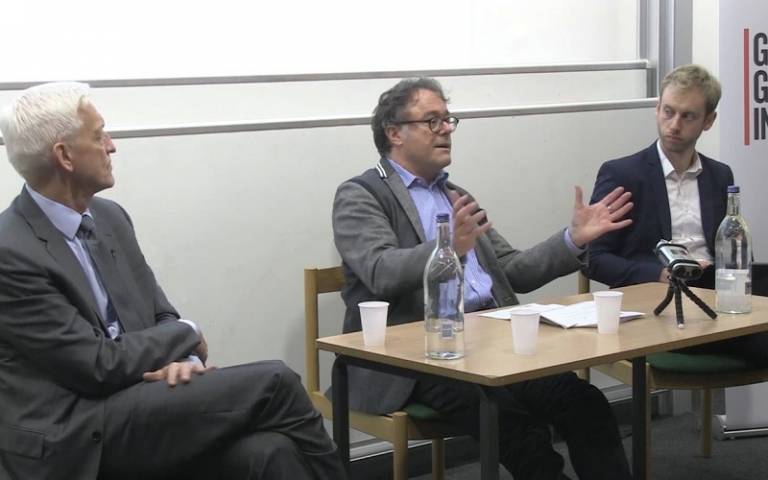Global Governance: Fragmentation, Stagnation, Transformation?
13 December 2016
Kateřina Tolarová (MSc Global Governance and Ethics) on a GGI keynote lecture with Professor Miles Kahler.

Recent developments in international politics such as the retreat from European cooperation, the adoption of the Paris Agreement and the US presidential election have triggered debates about the prospects for global governance. Should we expect a period of gridlock and stagnation in the absence of US leadership? Does the new regionalism threaten to fragment the existing global order? Or are we merely witnessing the emergence of new, more hybrid forms of governance?
To discuss these questions, the Global Governance Institute recently hosted Professor Miles Kahler, Distinguished Professor at the American University's School of International Service and Senior Fellow at the Council on Foreign Relations (CFR). Professor Kahler's current research focuses on the role of emerging economies in global governance and the challenges to nation-states in the international system.
Consequences of a Trump presidency - beliefs and constraints
Professor Kahler started his talk by discussing the consequences of a Trump presidency for global governance. For the first time in history, American voters have elected a president with no prior political or military experience. While this makes it difficult to assess his personal beliefs and views, Trump has consistently displayed a defensive nationalist world view, advocating for disengagement and unilateralism - a position that has not been seen in American foreign policy since the 1930s, according to Kahler. Equally consistent has been Trump's embrace of anti-intellectualism evident in his rejection of climate change science. However, in other issue areas it is difficult to determine whether Trump's positions represent fixed beliefs or simply rhetoric. For example, it remains unclear whether Trump believes in an active or a small government. As Kahler pointed out, while the Republican elite has traditionally advocated for a small government, Trump has repeatedly called for a more active government and promised to boost infrastructure spending.
What are the potential constraints on Trump's political behaviour? Typically, in the case of an inexperienced president, advisors become crucial. So far, Trump has chosen a relatively conventional Republican cabinet including some of his former critics but we do not know yet how much power and influence his advisors will have. Trump will also face a divided Republican party and an extremely polarised electorate that might further constrain his power. Lastly, Trump will be constrained by the rest of the world as other major countries such as China can push back.
The new regionalism and the risk of fragmentation
Another possible trend constraining the power of the new president-elect is the emergence of new regionalism. Since the 2000s, we have seen the emergence of a number of regional institutions and initiatives led by the emerging economies. This new regionalism is driven largely by dissatisfaction with the performance and the underlying power structures of global institutions. Since smaller groups of states are more likely to have shared goals and understandings, regional cooperation can be an efficient mode of governance. However, the proliferation of alternative regional governance fora also threatens to fragment existing governance structures.
One way to avoid fragmentation is for the US and the EU to re-engage with global institutions, reform them and make them more attractive for emerging economies. However, under the new presidency, the US is likely to disengage from international organisations. Consequently, defensive regionalism is likely to play a greater role in global governance as we can expect emerging powers to also withdraw from global organisations and, instead, take on leadership roles in regional institutions such as the Chiang Mai Initiative, the Asian Infrastructure Investment Bank (AIIB), or the New Development Bank of the BRICS. China, for instance, moved forward with the Free Trade Area of the Asia-Pacific (FTAAP) initiative immediately after the US elections.
Stagnation - gridlock and loss of political support
Kahler suggested that another consequence of Trump's presidency on global governance is the potential disengagement of the US, which might lead to a period of gridlock in international organisations. Although the absence of US leadership could provide an opportunity for the emerging powers to step in, he considered this scenario to be unlikely. This is due to the lack of international coalitions to back up the efforts of emerging powers, the lack of domestic support for providing global leadership and the need to prioritise a variety of complex domestic issues.
Stagnation could also be caused by the loss of political support for globalisation and global governance institutions, especially in the Global North. Inequality remains the predominant explanatory drivers of populism and opposition to globalisation. However, as we have seen in the US election, the underlying dynamics are often more complex. For instance, many Trump supporters are middle class and employed and therefore not affected by the immediate consequences of globalisation. As Kahler pointed out issues such as the fear of a loss of status of certain racial groups, particularly white male working-class Americans; a cultural backlash and insecurity caused by the fear of terrorism have played a crucial role in the election. It is also important to keep in mind voters' place of residence and how that affects voting preferences. Unsurprisingly, more people in developed areas tend to support globalisation and trade compared to those living in areas of economic decline. However, this is not necessarily a reflection of peoples' personal situations: In many areas that have not benefited from globalisation, such as small industrial towns and rural areas, the surroundings are in decline, not the individuals. Consequently, in these areas individuals tend to resort to sociotropic voting, in other words, rather than voting on the basis of their own economic situation they vote for what they perceive to be a brighter future for their children and their community.
Transformation: new forms of global governance
Fragmentation and stagnation are not the only trends in global governance. We are also witnessing the emergence of what Kahler has termed complex governance: a form of global governance that moves beyond intergovernmental organisations to a much more heterogeneous group of actors that contribute directly to governance and form coalitions and networks with other types of actors. Complex governance is also multi-level since national governments can no longer keep subnational governments and local actors out of the picture. Outcomes of these arrangements are typically informal, less institutionalised and not legalised. Complex governance tends to be concentrated in newer issue areas such as climate change, global health and (to a degree) peace-building.
How does complex governance compare to traditional forms of global governance? Is it more efficient and/or more legitimate? The answer, Kahler argued, is not straightforward. For example, emerging economies often perceive complex governance as yet another facet of industrialised countries' domination since Western NGOs and multilateral organisations tend to dominate these arrangements. An important open question is whether complex governance is always a "second-best option" (something we choose only when we cannot get a formal intergovernmental arrangement) or whether there are circumstances under which it constitutes a better form of governance. This could be the case in issue areas such as climate change, where multiple actors need to be targeted.
What lies ahead for global governance?
The impact of Trump's presidency on global governance remains unclear because of the cloud of uncertainty that surrounds his future course of action. Kahler argued that the leadership vacuum, in the case of US disengagement, would not be filled by emerging powers. Whether European powers would take on a leadership role remains to be seen. Another interesting point of the talk is the divide between the perception of globalisation in industrialised countries and the developing world. While developing countries have a much more positive outlook on globalisation and its benefits, we can observe a rise of anti-globalisation movements in Western states. Moreover, sociotropic voting is a particularly current phenomenon that might play an important role in the upcoming French presidential elections as many people in communities that are perceived to be in decline are expected to cast their vote to the Nationalist Front. Consequently, the global liberal community must address the loss of confidence in globalisation and global governance institutions in order to counter the rise of populist nationalist parties and leaders.
 Close
Close


